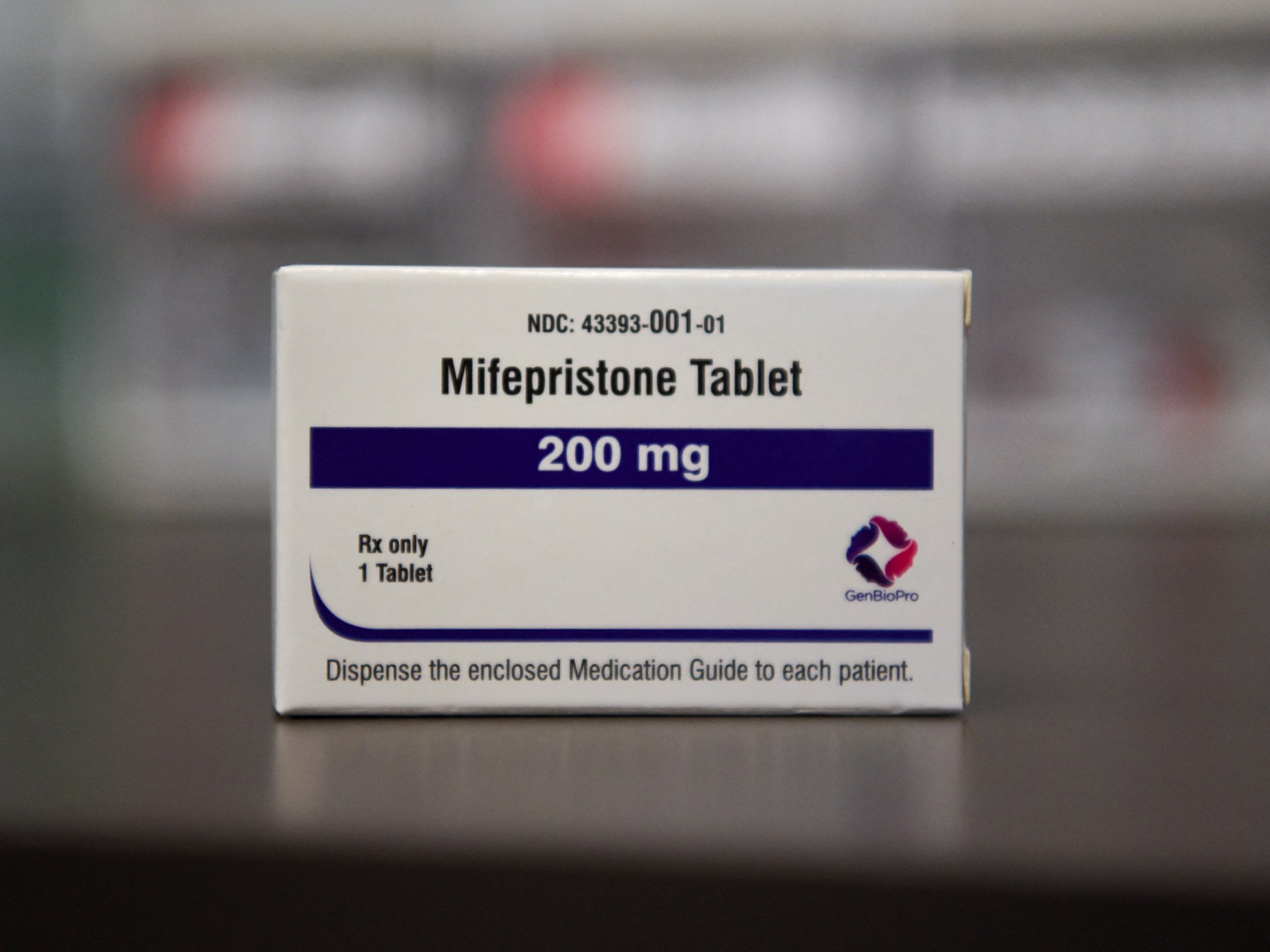What to know about the abortion pill mifepristone
The United States Supreme Court is scheduled to issue a decision that could impact access to mifepristone, an abortion pill used in more than half of all abortion procedures in the US.
Mifepristone was approved in 2000 by the Food and Drug Administration (FDA), the government agency responsible for determining the safety of drugs and medication. But earlier this month, a conservative judge in the US state of Texas issued a ruling barring the sale of mifepristone beginning on April 7.
That decision was quickly appealed by the Biden administration and has now made its way to the Supreme Court, which is expected to issue a ruling before a self-imposed deadline of midnight on Friday.
What is mifepristone, why is its being contested, and what would restricted access to its use mean for people in the US? Al Jazeera takes you through the issues.
What is mifepristone?
Mifepristone is a widely used abortion pill, often taken as the first in a two-part procedure including a second pill called misoprostol. Taken together, the pills can be used to stop a pregnancy for a period of up to 10 weeks.
Misoprostol can be taken as a single pill to terminate a pregnancy, but scientists say that taking it along with mifepristone is more effective.
Mifepristone was approved by the FDA in September 2000 for use up to seven weeks of pregnancy. In 2016, the FDA extended its use through 10 weeks, in an effort to ease access.
In recent years, pills have become the dominant form of abortion in the United States, accounting for more than half of all US abortions. In 2020, the Guttmacher Institute, a pro-abortion rights group, found that 53 percent of all legal US abortions were conducted through medication, up from 39 percent in 2017.
Is it safe to use?
Yes. There is a strong scientific and medical consensus that mifepristone is a safe way to terminate a pregnancy, and it has been used by millions of people in the US and around the world for decades.
Mifepristone can be taken alone in a private place like a home, with some side effects such as bleeding and brief abdominal pain. Serious complications can occur but are rare.
In January, the FDA expanded access to the pill by approving it for sale at US pharmacies and permanently allowing people to receive the medication in the mail, continuing a policy implemented during the COVID-19 pandemic.
Why is mifepristone’s use being challenged?
In June of last year, the US Supreme Court, with a 6-3 conservative majority, ruled to overturn Roe v Wade, a 1973 case that had enshrined the constitutional right to an abortion.
Many Republican-led states across the country had already enacted various restrictions meant to diminish access to abortion. However, with the repeal of Roe, states gained the ability to ban abortion entirely, and more than a dozen states have enacted such bans in the time since.

Anti-abortion rights advocates view pills like mifepristone as an important fight in the ongoing battle to determine access to reproductive health services and have pushed for greater restrictions on their use.
In Texas, a coalition of anti-abortion medical providers called the Alliance for Hippocratic Medicine filed a lawsuit challenging the FDA’s approval of mifepristone, stating that the pill is unsafe and should never have been approved.
The case went before District Judge Matthew Kacsmaryk, a Trump-appointed judge with a reputation for sympathy to conservative causes, who ruled in favour of the anti-abortion group’s request for an injunction on mifepristone on April 7.
If allowed to stand, the decision would further restrict access to abortion services in the United States, where millions of people have already lost or experienced diminished access in the aftermath of the decision to overturn Roe.
What happened next?
The injuction would have suspended mifepristone sales in the US as litigation continues, but Kacsmaryk’s decision gave the Biden administration seven days to appeal before the order went into effect.
The decision is considered the first instance of a judge challenging the authority of the FDA to make decisions regarding the health and safety of a medication, and health experts have warned that the ruling, if allowed to stand, would diminish the agency’s authority.
Shortly after Kacsmaryk’s ruling, another judge in the state of Washington issued a decision blocking “any action to remove mifepristone from the market”.
Three days later, the Biden administration filed an emergency motion asking an appeals court to temporarily halt Kacsmaryk’s injunction, stating that it would undermine the authority of the FDA and diminish access to necessary healthcare.
White House Press Secretary Karine Jean-Pierre said at the time that the government stood by the FDA’s approval of mifepristone. She added that the administration expected the case would end up before the Supreme Court and was “pretty confident that we’re going to win”.
On April 13, an appeals court in New Orleans rolled back some of the restrictions from Kacsmaryk’s ruling, keeping the pill legal but upholding significant restrictions, revoking the ability to receive it in the mail and requiring an in-person visit to the doctor.
The Biden administration quickly appealed that ruling to the Supreme Court, which issued a temporary stay on the restrictions a week ago, extending the stay for a two-day period on Wednesday.
It is scheduled to issue a ruling by a self-imposed deadline of Friday before 12 PM US Eastern Time (4:00 GMT Saturday).




